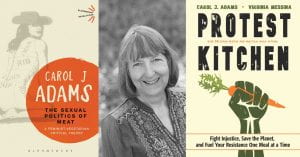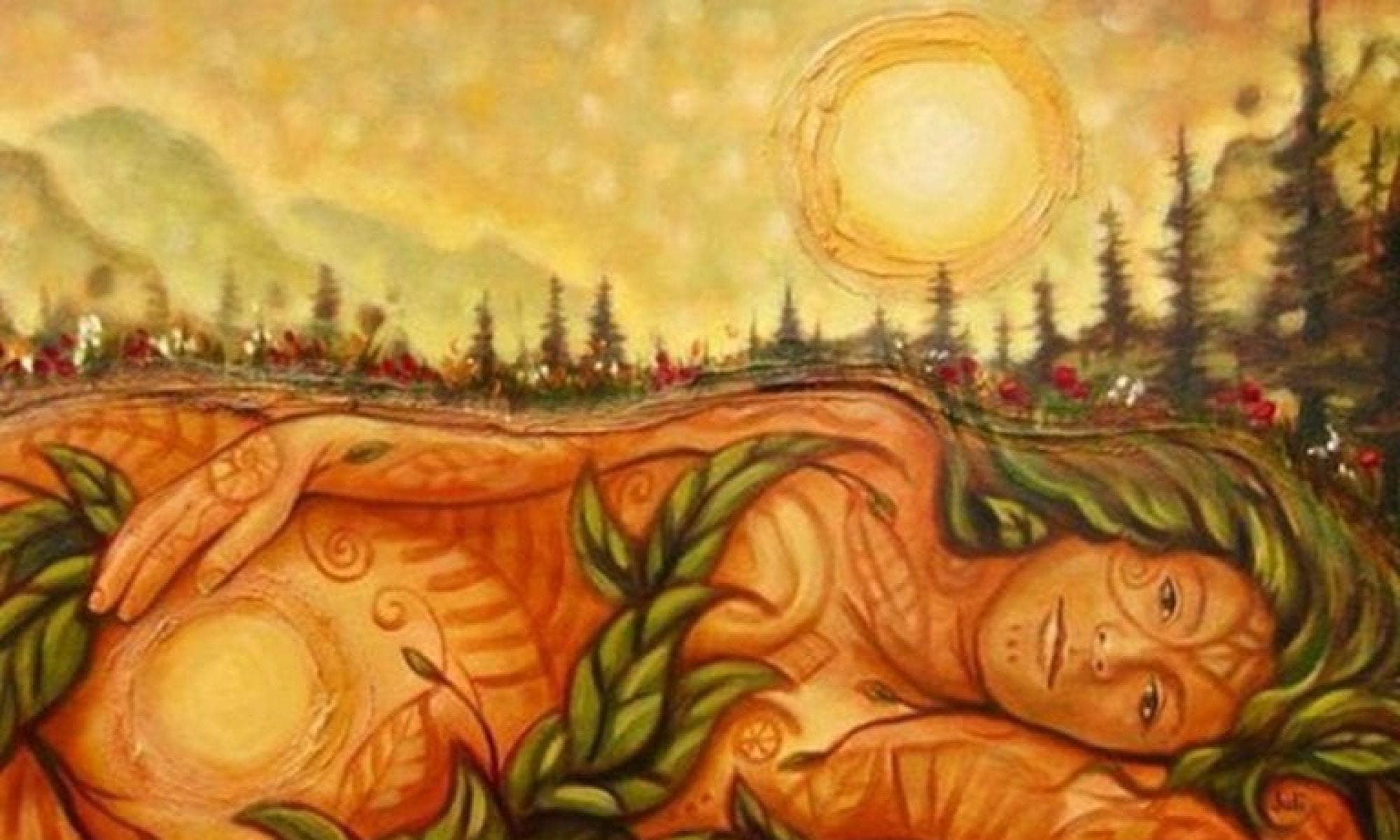…. the death of the nonhuman animal whose place the meat takes.” C. Adams

Carol Adams Carol J. Adams (born 1951) is an American writer, feminist, and animal rights advocate.
Feminist-vegan theory is ecofeminist. From this perspective, “environmental issues can’t be understood without a feminist perspective and feminist issues can’t be understood without an environmental perspective. I place animals into the middle of this”. (Carol Adams, The War on Compassion). Adams has a unique perspective in terms of her views on the questionable morality behind slaughtering animals for food. When humans turn a nonhuman into “meat,” someone who has a very particular, situated life, a unique being, is converted into something that has no distinctiveness, no uniqueness, no individuality. When one adds five pounds of meatballs to a plate of meatballs, it is more of the same thing; nothing is changed. Adams describes her viewpoint which includes how killing animals disrupts the natural balance of nature. “But to have a living cow and then kill that cow, and butcher that cow, and grind up her flesh, you have not added a mass term to a mass term and ended up with more of the same. You have destroyed an individual. (Carol Adams, The War on Compassion).
The “massification” of beings permits the dilution, the diminishment of our attention. It is like an hourglass. The more of a “mass term” they become, the less of concern they need provoke. The sands of our compassion drain into the bottom. And how do we flip the hourglass over, how do we revive, or awaken compassion?
And this is a basic difference; meat eaters bury animals in their own bodies. When nonhuman living beings are converted conceptually into false mass terms to enable their conversion into products, we come to believe that their deaths do not matter to themselves. Animals are killed because they are false mass terms, but they die as individuals. They die as a cow, not beef, as a pig, not pork. Each suffers his or her own death, and this death matters a great deal to the one who is dying. (Carol Adams, The War on Compassion).

The Politics of Carol J Adams
When Carol was asked what about raw meat that made it more offensive, her answer was. “Raw meat may express a more immediate sense of violation of what once was, what once existed and only recently lost their lives. With the raw, there is always more of it — more raw talent to compete in a realty show, more raw meat to be hung in lockers or worn as undergarments. Why raw meat? It is as though through the use of raw meat there’s some sort of fantasy that one can experience life again as “raw, fresh, and tasty,”
There are many individuals who do not subscribe to the ideology that non-human living beings’ “matter”. In response to these critics, Adams writes ..”Nonhuman animals matter because of who they are — individual beings — not because of a certain quality that obtains to them (their suffering). This isn’t like parliamentary procedure where there has to be a second to the first (the “second” being “animals are suffering”). The minute we start arguing about suffering (for women or animals, or anyone who is nondominant), we’re already ceded their difference.
As Catharine MacKinnon points out in Of Mice and Men, white men did not have to prove they suffered for them to have rights. The focus on suffering creates a new category “humane meat” that helps people reduce the issue to “they aren’t suffering, so it’s okay to eat them.”
I don’t mind being disturbed, upset, dismayed, or depressed, but I don’t want to be the second hand beneficiary of violence, engaging in an act of viewing that can only exist because someone’s death was willed, because someone’s energy was the means to another’s ends.
Advertising and the “Sexualization” of Women

This photograph depicts a tag that would be fastened to an animal’s ear prior to it being killed. Apparently a “Dick from Hell” attached it.

This ad has to be one of the most offensive towards women that I have ever seen. To reduce to act of childbirth to a sexual, cheap analogy with having hamburgers delivered to your door is egregious! I wonder if they think of their mother when they created and approved this ad.
I found this ad from Hardee’s…can it be more offensive, patronizing and sexists? I don’t think so…..
Graphic Images and Content

Hi Catherine,
You make use of some powerful quotes from Adams that offer the clear message that when we separate the animal from the meat that is consumed, we dehumanize the animal and make it easier for us to ignore the ethical implications of our consumption choices. We see the meat on our plate as a product rather than the result of a sentient being’s death, which ultimately desensitizes us to the suffering of non-human animals.
An image is worth so much more than words. The video you shared, although graphic, is a necessary component of the awareness process and it greatly emphasizes the message that only by recognizing that animals are individuals with inherent value, we begin to shift our perspective towards a more compassionate and empathetic understanding of the animals we consume. We begin to understand that their deaths are not just a part of a production line, but a loss of a unique life that mattered to the non-human being who was killed.
When we reduce animals to mere products, we strip them of their individuality and unique identities. In doing so, we not only perpetuate the false notion that animals are inferior to humans, but we also ignore the reality of their sentience and ability to feel pain and suffering, as well as their fundamental worth as individual beings.
However, recognizing non-human animals’ inherent worth and dignity challenges the deeply ingrained societal norms that have led to their exploitation and commodification. It forces consumers to rethink our relationships with other beings, which I find it is something most people are uncomfortable discussing, which is why the intersectionality of feminist and environmental issues cannot be ignored in this conversation.
Ultimately, the ethical treatment of non-human animals is not just about their individual well-being, but about creating a more compassionate and sustainable future which requires us to continuously challenge deeply ingrained societal norms and to prioritize the interconnectedness of all living beings and the preservation of the natural balance of nature.
Works Cited:
Potts, Annie, and Carol J. Adams. “The Politics of Carol J. Adams.” Antennae, no. 14, 2010, pp. 12–24., https://static1.squarespace.com/static/54792ff7e4b0674c74cb719d/t/55dc8dace4b0ad76d7277cb7/1440517548517/ANTENNAE+ISSUE+14.pdf. Accessed 3 Mar. 2023.
An Afterthought:
Out of the mouth of babes… A child’s innocent and pure compassion for all living beings. This video always makes my heart ache for this little girl’s unconditional love of animals and her distress over consuming them.
https://youtu.be/Zgh4HKSvrsc